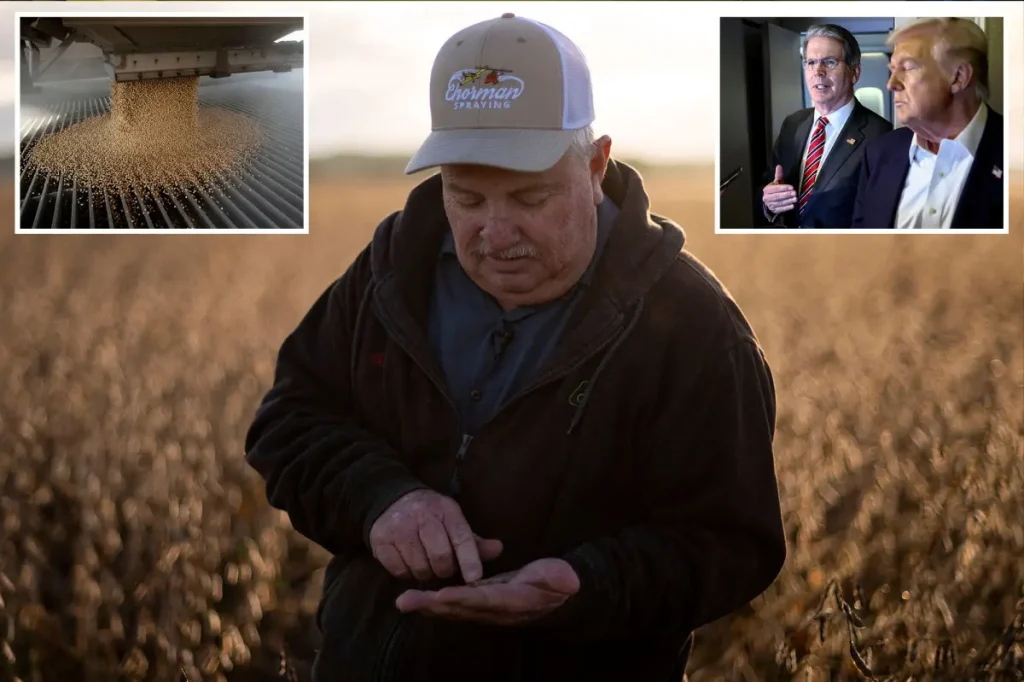Treasury Secretary Bessent Empathizes with Struggling Soybean Farmers Amid China Trade Tensions
In a revealing interview with ABC News’ “This Week,” Treasury Secretary Scott Bessent expressed personal connection to the plight of American soybean farmers affected by China’s purchasing cutbacks. “Martha, in case you don’t know it, I’m actually a soybean farmer, so I have felt this pain, too,” Bessent told anchor Martha Raddatz when she noted how American farmers have suffered. This statement offers a glimpse into the complicated relationship between high-level government officials and the agricultural communities they represent. While Bessent does own substantial farmland in North Dakota worth between $5 million and $25 million according to his financial disclosures, his perspective comes from a position of considerable wealth—Forbes estimates his net worth at approximately $600 million from his career as a hedge fund executive. His land generates between $100,000 and $1 million in rental income annually, placing him in a very different financial situation than many struggling family farmers across America’s heartland.
The challenges faced by American soybean farmers stem directly from the ongoing trade tensions with China, which historically has been the largest international buyer of U.S. soybeans. In recent years, China alone purchased more than half of all soybeans grown in the United States, making their sudden withdrawal from the market devastating for American producers. As diplomatic and trade relations deteriorated, Chinese buyers turned to alternative suppliers, particularly Argentina and Brazil, leaving U.S. farmers with surplus crops and declining prices. The impact has been widespread across farming communities, with many family operations facing financial uncertainty after generations of stable production. Unlike Bessent, whose diverse financial portfolio provides significant protection against agricultural market fluctuations, many farmers depend entirely on consistent crop sales for their livelihoods, making China’s purchasing decisions existentially important to their financial survival.
Adding to farmers’ frustrations was the recent White House announcement of a $20 billion currency swap with Argentina—a move that potentially strengthens a direct competitor to American soybean producers. This financial arrangement with Argentina, whose president Javier Milei has been an early ally of former President Trump, came at a particularly sensitive time. Just before this bailout was announced, Argentina dropped its export taxes, making its soybeans even more attractive to international buyers. China quickly capitalized on this opportunity, purchasing 7 million metric tons of soybeans from Argentina while importing zero soybeans from American farmers in September. This sequence of events left many U.S. agricultural producers feeling abandoned by their own government. Aaron Lehman, president of the Iowa Farmers Union and a soybean grower himself, expressed this sentiment clearly: “At a time when we should be finding ways to help American farmers deal with this chaotic trade policy, it’s extremely disappointing to see us bailing out Argentina and Argentina farmers in the process.”
Despite these significant challenges, Secretary Bessent projects optimism about future prospects, suggesting that a forthcoming trade deal with China will encourage the nation to resume purchasing American soybeans. “Our soybean farmers will feel very good about what’s going on after the China trade deal is announced,” Bessent assured Raddatz during the interview. This confidence appears to be shared by former President Trump, who on Monday expressed certainty that the U.S. will “come away with the deal” following his scheduled meeting with Chinese leader Xi Jinping in South Korea. The proposed framework would likely eliminate Trump’s threatened 100% tariff on Chinese goods, delay Beijing’s export controls on rare earth minerals, and transfer ownership of TikTok to American entities. While these terms address several international trade concerns, the immediate question for many farmers remains whether such an agreement would actually restore China’s purchasing patterns for American agricultural products to previous levels.
The soybean situation highlights the complex interconnections between international diplomacy, trade policy, and the everyday livelihoods of American agricultural producers. For generations, farming communities have navigated the uncertainties of weather, market fluctuations, and changing consumer demands. However, the recent politicization of international agricultural trade has introduced a new level of unpredictability that even the most experienced farmers struggle to manage. When major export markets can disappear overnight due to diplomatic disputes, the traditional risk calculations that guide planting decisions and financial planning become nearly impossible to make with confidence. This uncertainty affects not just individual farmers but entire rural communities whose economic ecosystems depend on agricultural prosperity—from equipment dealers and seed suppliers to local businesses and schools that serve farming families.
The tension between Bessent’s personal financial security and the precarious position of many American farmers underscores broader questions about representation and understanding within the highest levels of government. While the Treasury Secretary’s ownership of farmland provides him with some perspective on agricultural issues, the substantial differences in scale and financial exposure between his situation and that of typical family farmers create an inevitable disconnect. As negotiations with China proceed and new trade frameworks take shape, American soybean producers will be watching closely to see whether their interests are genuinely represented or merely referenced in political discussions. For these farmers, the outcome isn’t about theoretical economic policy—it’s about whether they can continue the agricultural traditions that have sustained their families and communities for generations. The resolution of this situation may reveal much about how effectively the current administration balances international diplomatic objectives with the immediate needs of American agricultural producers.











